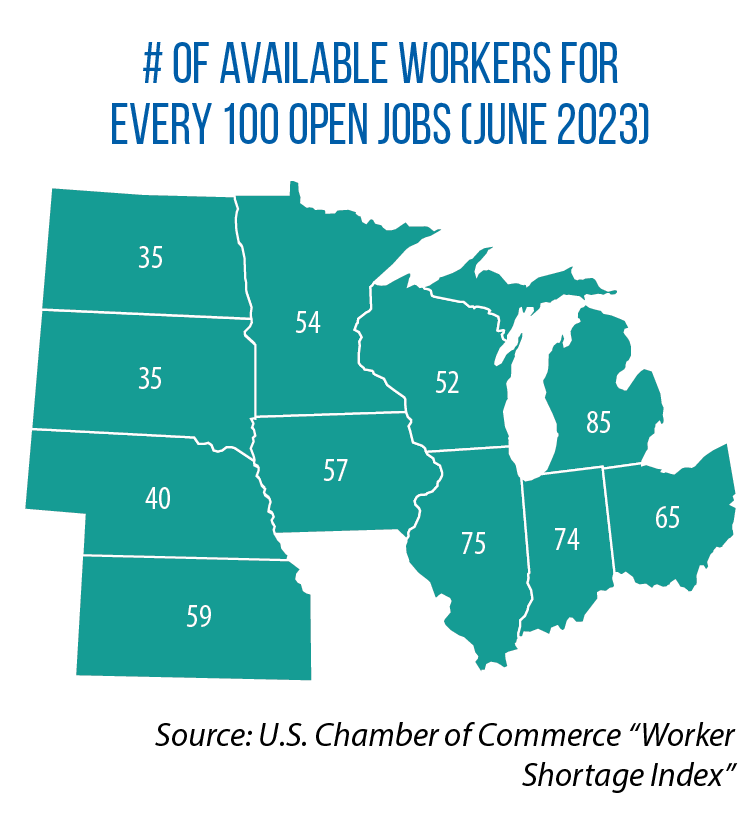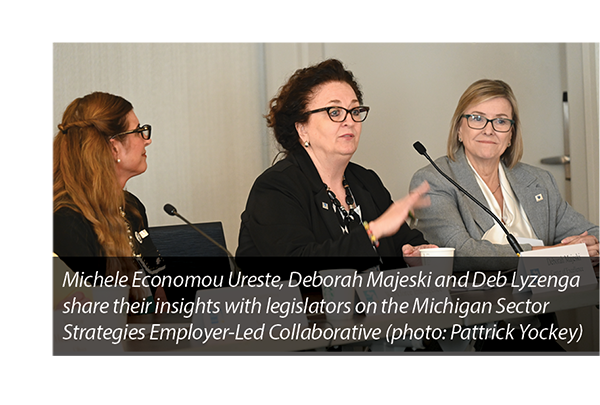In Michigan, a public-private partnership takes a sector-specific approach to building a skilled workforce
In many economic sectors and parts of the country, the United States does not have enough workers to fill open positions (see map for Midwest).
One strategy being pursued in Michigan to build talent pipelines in high-demand areas: a unique public-private partnership known as Sector Strategies Employer-Led Collaboratives, a brainchild of the state’s Department of Labor and Economic Opportunity (LEO).
“[We] leverage the power of multiple employers within an industry coming together to say, ‘This is what I need in a person. These are the skills. These are the competencies. This is the education, the credentials that I need them to have,’ ” Deb Lyzenga, an LEO division administrator, said during a July session of the Midwestern Legislative Conference Annual Meeting.
“Then we start bringing in our educators, our workforce system, our labor partners.”
Michigan now has more than 60 formally identified employer-led collaboratives, in sectors such as energy, health care, mobility, infrastructure, agriculture, manufacturing, information technology and hospitality. The state provides grants and technical assistance.
Working together, business leaders from the same economic sector identify common in-demand, unfilled positions; pinpoint barriers to hiring; evaluate recruitment strategies; and establish agreed-upon outcome metrics to track the collaborative’s progress. They also develop employee training plans that can be implemented throughout the sector and in educational institutions.
 Once a collaborative has met, articulated its goals and executed a plan, the department helps evaluate progress.
Once a collaborative has met, articulated its goals and executed a plan, the department helps evaluate progress.
“We go back to the employers and we say, ‘How did that work? Did you hire the people that you wanted to? Are they up to speed in their job as fast as you expected them to be? Tell us what the gaps are,’ ” Lyzenga said.
“As a workforce system, it’s systemic change. We’re starting to talk the same language.”
Earlier this year, the state awarded $4.6 million in grants to develop new collaboratives and maintain existing ones.
During the session, organized by the MLC Education and Workforce Development Committee, lawmakers heard from individuals directly involved with the employer-led collaboratives.
Deborah Majeski, manager of DTE Energy’s Center of Excellence Workforce Development, has been part of an energy-focused collaborative since 2016.
“We have well over 5,000 different job roles that we offer,” Majeski explained. “Michigan’s energy [sector] accounts for more than 116,000 energy-related careers, with the demand [projected to grow by] 7.5 percent between 2020 and 2030.”
From this collaborative, myriad training programs have been integrated into secondary and postsecondary schools; for example, a college-credit-awarding program known as the Energy Industry Fundamentals Course will be offered this fall at six Michigan high schools and seven community colleges. It prepares students to enter 15 job roles in the energy sector — roles that are available to individuals of varying educational attainment levels.
At Henry Ford College, 40-foot utility poles have been built on campus for prospective electrical line workers as part of the Power and Trade Pathways Program, through which students can pursue an associate degree or certificates in various energy-related skilled trades.
The collaborative also helps expose middle and high school students to possible careers in renewable energy, via virtual field trips and accompanying workbooks.
A newer collaborative is focused on electrical vehicle manufacturing. The initial focus of this “EV Jobs Academy” has been to collect workforce data and share results with industry leaders.
“Our labor-market intelligence really informs our regional training strategies, [our] curriculum development,” Michele Economou Ureste, executive director of the Workforce Intelligence Network for Southeast Michigan, said.
Once top occupation sectors and related skills are identified, she added, the EV Jobs Academy will work with Michigan colleges and universities to develop new learning and training opportunities on a shared online platform.
At the same time, it is collaborating with other industry groups to secure grants from the federal Infrastructure Investment and Jobs Act and to develop new apprenticeship opportunities for prospective workers in the EV manufacturing field.